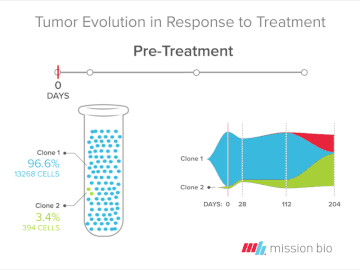Charlie Silver, Co-Founder & CEO, Mission Bio
Cancer is smart. Yes, you read that right.
The disease isn’t intelligent in the traditional sense — but cancer cells are adaptable, ‘learning’ from their environment and constantly evolving to improve survival. While targeted therapy can be effective at first, this evolution means that treatment resistance and disease progression remain a challenge.
To effectively combat cancer — to both detect it sooner and develop the most impactful, dynamic therapies — we need to be able to understand it. This means tracking the progression of each and every cancerous cell.

At Mission Bio, we’re tackling this problem by giving researchers and clinicians the precision and resolution to look at disease origins and paths of progression.
Today, I’m excited to share that our Tapestri Platform® has been adopted and deployed by researchers at leading cancer centers for its ability to track and monitor cancer evolution at the single-cell level. The study, published in Cancer Discovery, and led by researchers from the University of California San Francisco (UCSF) and the University of Pennsylvania (Penn) uncovers the potential for more impactful, dynamic therapy development and application for those with Acute Myeloid Leukemia (AML).
The teams sought to evaluate patterns of disease resistance in AML patients, identifying those treatment-emergent mutations missed by traditional sequencing methods. Tapestri’s unique sensitivity empowered the researchers to monitor the evolution of the disease in response to targeted therapy, ultimately revealing how specific mutations drove subsequent therapy resistance in patients.
In monitoring clinical resistance at the single-cell level, we have the potential to develop therapies that mirror the dynamism of cancer. In short, these findings put us on the precipice of the next frontier of precision medicine.
Empowering breakthroughs that can save patient lives is key to our work at Mission Bio. Our Tapestri Platform is uniquely equipped to translate meaningful discoveries in single-cell genomics to the clinic, where a real difference can be made in patient care and ultimate outcomes.
We have a long way to go in eradicating cancer, but this is a major step forward.
Cancer is smart. But we can be smarter.










